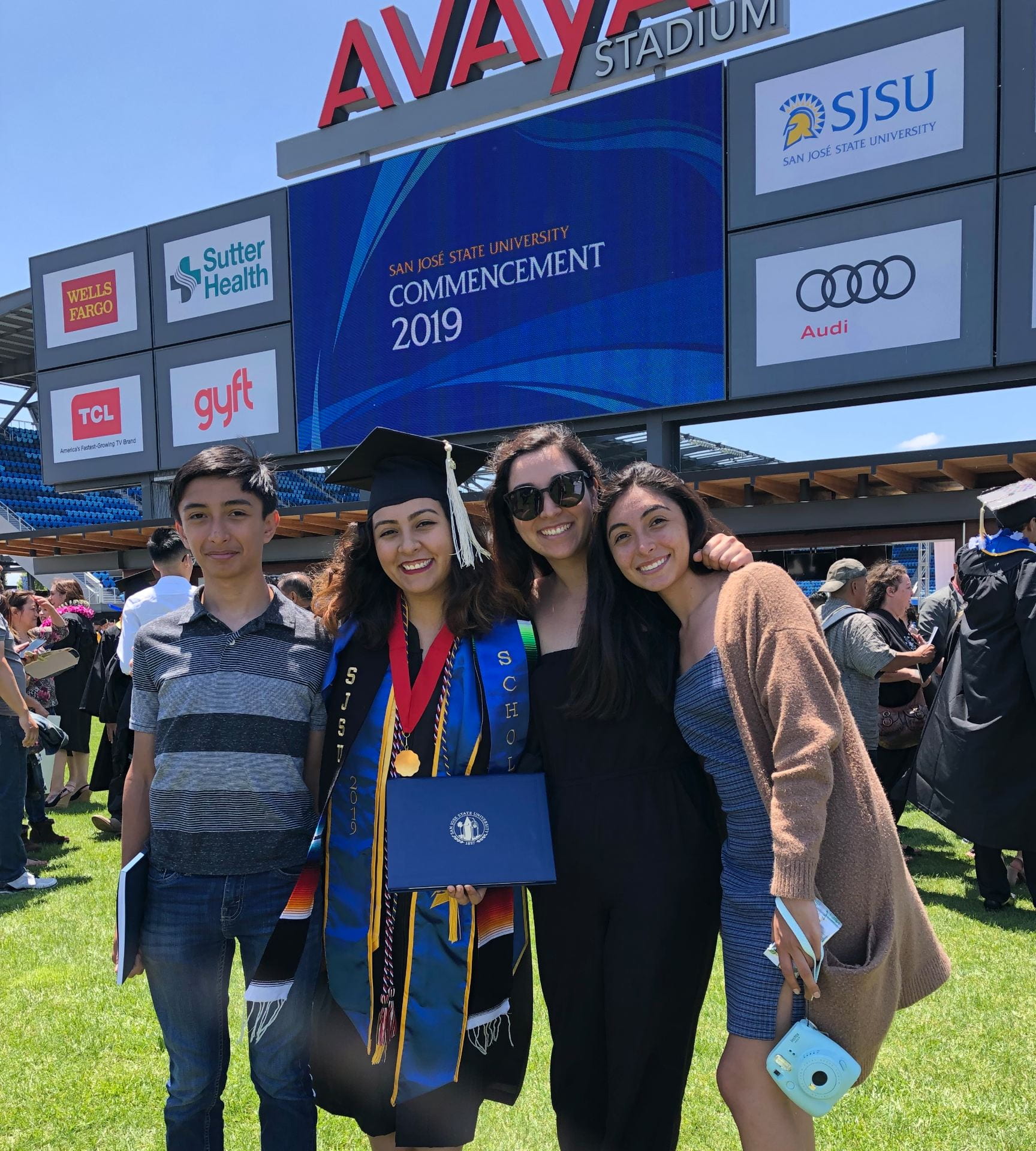
Angeles De Santos-Quezada poses for a photo at her graduation from the College of Social Sciences May 24.
By Abby McConnell
To anyone who knows her, it’s no surprise that McNair Scholar Angeles De Santos-Quezada graduated with honors, with a bachelor’s in Political Science and a minor in Applied Research Methods. Politics, advocacy and education have always been at the forefront of her life. She grew up in Encarnacion de Diaz, Jalisco, a small town in Mexico, with a mother who emphasized the importance of intellectual enrichment and a father who practiced law and often discussed the likes of Plato, Socrates and Marx at the dinner table.
This background served her well, especially after De Santos-Quezada moved unexpectedly with her mother and three siblings from Mexico to her grandmother’s home in Concord, California. De Santos-Quezada’s mother is a U.S. citizen who moved to Mexico in her 20s to be with De Santos-Quezada’s father, and later decided to naturalize her children.
Leaving the only home she’d known and transitioning into an American high school as a junior wasn’t easy for De Santos-Quezada, from making new friends to being placed in classes as an “English Language Learner.” Being labeled ELL meant she was placed on the easiest academic track in her new high school, essentially retaking many classes that she had completed with honors at a private Catholic middle school in Mexico. De Santos-Quezada quickly became bored and frustrated, aware that this route wouldn’t get her to college, which had always been her plan.
“I wasn’t sure what to do, but when I told my mom what was happening, she told me I needed to advocate for myself to have my schedule changed. She made it clear that no one else was going to do it for me,” De Santos-Quezada said.
She set up a meeting with her counselor as soon as she could, and was on a college preparatory track shortly thereafter. For De Santos-Quezada, this was not only a lesson in the importance of speaking out and speaking up, but also firsthand experience of the disenfranchisement many non-native speakers feel when they enter the U.S. educational system.

SJSU graduate Angeles De Santos-Quezada plans to attend the University of Texas, Austin in fall to pursue a master’s in Education Policy and Planning.
“When I was about to graduate high school, one of my teachers told me that I was a ‘normal’ English speaker. I didn’t know I was abnormal! ELL students are often treated as less intelligent simply because English isn’t their first language. Obviously, that is discriminatory and also a false premise. When students are labeled in this way, they are put at a disadvantage and aren’t set up to succeed. I knew then there was something deeply wrong with the system.”
She loved SJSU immediately, in part because the Spanish architecture and diverse community reminded her of home. Freshman year held the allure of living on her own for the first time, but she was also lonely during her first weeks in the dorms. Her resident advisor was a huge source of comfort and guidance for De Santos-Quezada and was instrumental in helping her find her place on campus. The experience inspired her to become an RA, which she has done for the last three years. In that time, she has helped nearly 200 first-year students navigate the transition to college and take advantage of all that SJSU has to offer.
Advising students about the best ways to maximize their college experience while connecting with like-minded people is one of her favorite aspects of the job, in part because she can relate. When she felt most isolated at SJSU, she realized she needed to seek out clubs and opportunities that reflected her background and interests like she had in high school, so she began attending meetings via the Adelante Latino Task Force that later involved into the Chicanx/Latinx Student Success Center.
“By becoming a part of the Latinx campus community, I was able to find my place at SJSU and thrive,” she said.
And thrive she has―in the fall, she is headed to the University of Texas, Austin to pursue a master’s in Education Policy and Planning (MEd). In her undergraduate career, De Santos-Quezada has also been named a President’s scholar, has published and presented scholarly research, studied abroad in Slovenia, and become an outspoken advocate of social justice and diversity programs for underrepresented students.
“As a first-generation college student, Angeles exemplifies the transformative power of educational opportunity and is already ‘paying it forward’ to help other students find their own paths to success,” said Dr. Melinda Jackson.
De Santos-Quezada credits much of her success at SJSU to TRIO programs such as Aspire, and of course, the McNair Scholars Program, which is specifically designed to guide underrepresented students in applying to doctoral programs. She also acknowledges her family’s unwavering support along with many mentors and professors, including Dr. Maria Cruz, Dr. Sergio Bejar Lopez, Dr. Vanessa Fernandez, Dr. Lilly Pinedo-Gangai and Dr. Jason Laker, among others, who guided her along the way.
“I am lucky,” De Santos-Quezada said. “I was able to stand up for myself and take advantage of the resources around me and connect with all kinds of mentors and programs. Not all ELL students are able to do that, and so they get lost in our educational system. Part of my goal in getting my PhD is to answer the question: How can we treat our differences with pride instead of seeing them as positive or negative stereotypes? All I know right now is that we have to change the system from the inside out.”

